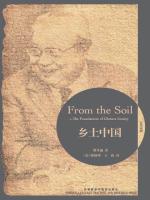Book Review
Do you really know the soil beneath your feet? Have you ever wondered about human relations, religious kinship, and traditional ritual? If so, FROM THE SOIL—THE FOUNDATIONS OF CHINESE SOCIETY can make you re-understand the land under your feet that has nurtured countless generations, and can let you solve the above doubts in your heart.
This book is an English translation of Fei Xiaotong's Xiangtu Zhongguo, based on the perspective of China's native China, using the method of field research, through the real appearance of rural life, to deeply analyze and discuss the internal laws and essential characteristics contained in the rural society, and is a very critical thinking book.
In this book, the author proposes two distinct moral systems, one is Chaxugeju and the other is Tuantigeju. What is Chaxugeju? What is Tuantigeju? What's the difference between the two? The author uses "Each person should sweep the snow from his own doorstep and should not fret about the frost on his neighbor’s roof" to introduce the chaxugeju, which is a multi-level social structure in which individuals and groups are divided into several levels according to different criteria, forming a multi-level social structure that is interconnected and has a certain distance. Chaxugeju is an orderly hierarchical structure, with members at each level enjoying different social status, power, and wealth, and these individual and group differences are the basis for the functioning of society. At the same time, author uses bundles of clear firewood to metaphorize tuantigeju of Western society, and then compare the two patterns, so that we can intuitively and clearly understand the difference between the two social patterns. In addition, the author also uses contrasting rhetorical techniques to put forward the concept of "family", which has a clear definition in Western society, but has different definitions in different situations in rural society, which further highlights the radical difference between the two societies, and also highlights the characteristics of Chinese rural society centered on "oneself". What makes me think is that Fei Xiaotong's chaxugeju is still reflected in the modern society we live in, "no one asks about the poor in the downtown area, and the rich have distant relatives in the mountains", the athlete Quan Hongchan has no relatives when her family is poor and needs help, but after becoming famous, there are unexpectedly several relatives who have not been in contact with her for more than 30 years to visit, which is vividly reflects chaxugeju in modern society.
This book is really worth reading. Mr. Fei's extensive fieldwork in Xiangtu Zhongguo provides a wealth of empirical data, making this book a valuable resource for anyone seeking to understand the experience of living in rural China. At the same time, the author's deep understanding of Chinese culture and society has always been reflected in his writing. His descriptions of rural life are full of anecdotes and cultural references that add depth and context to his arguments. Mr. Fei's analysis is profound and thought-provoking, giving readers a deeper understanding of the complexities of rural life in China. He explores themes such as tradition and modernity, social change and conflict, and the impact of globalization on rural communities, providing valuable insights into the transformations taking place in these regions. Moreover, Mr. Fei's critical analysis of rural China challenges stereotypes and conventional wisdom, providing a new perspective that encourages readers to question their own assumptions about rural China. In order for the author to better read the book or think deep7.The book includes informative appendices that provide further resources for readers seeking to delve deeper into the subject matter. These include maps, tables, and additional readings, enhancing the overall value of the book as a reference tool for students and researchers alike. In addition, the author uses a variety of argumentation methods when arguing his opinions, for example, “chaxugeju” mentioned above, the author uses comparative arguments and metaphorical arguments, as well as example arguments, etc., so that readers can more easily understand the meaning of what the author wants to express, and it is more convenient for us to read the book.
While this book is well worth reading, it also has some shortcomings. First of all, there is a certain complexity in its language, and the book contains some academic language, such as non-litigation and non-action politics, which may be difficult for some readers to understand. In this regard, before we read this book, we can understand the writing background of this book and some related knowledge in advance, or read related easy-to-read books to broaden our Xi knowledge in order to better understand this book. In addition, this book is based on the study of rural society in specific regions of China, which may have certain limitations, if we want to have a deeper understanding of China's rural society, it is far from enough for us to read this book alone, we should also look for more books for deeper reading and research.
In any case, if you read about rural China, you will definitely gain something, it may be an understanding of rural China, or it may solve some of your doubts about rural society.



 京公网安备 11010802032529号
京公网安备 11010802032529号